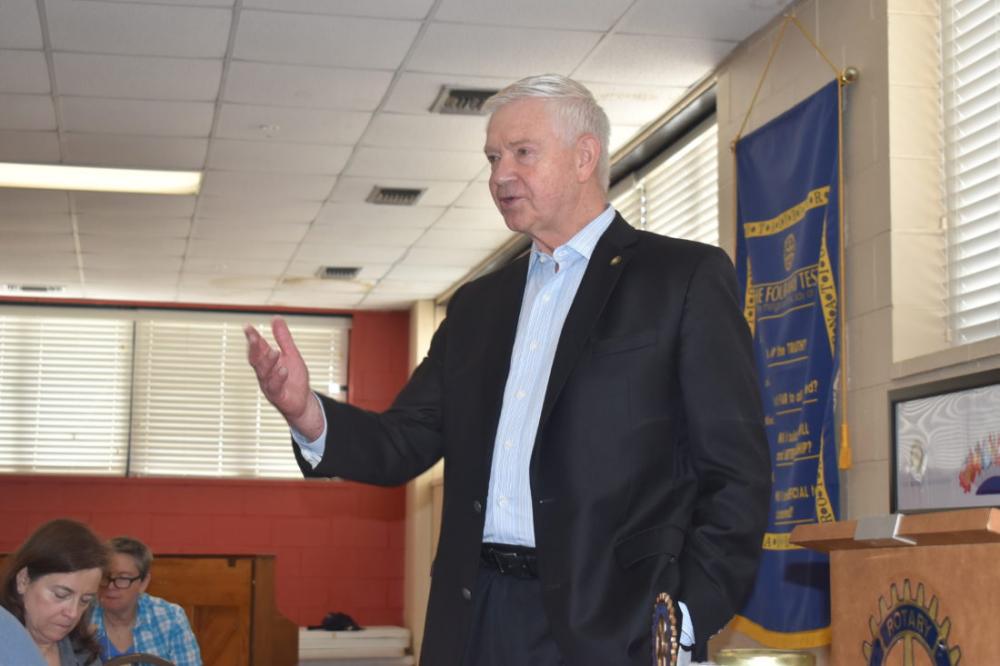|
ELKINS — A highly decorated military veteran offered
Elkins Rotarians a glimpse into what special forces units do as well
as talking about his plans now that he is retired.
Gen. Charles R. “Charlie” Holland, an Elkins native who now
lives in Tampa, Florida, served as commander for United States military
special operations forces when the Sept. 11, 2001 attack on New York
City took place.
“I was there when 9/11 happened, I was the commander. Of course,
everything that happened right after that happened very quickly, so
we didn’t have time to choose the time and place to react. Instead
that time and place was chosen for us and we reacted and we reacted
with vengeance,” Holland said.
He added a special operations forces motto is “We will not tire,
we will not falter, we will not fail.”
“In an international mission, whenever you go after people like
(Osama) bin Laden or Saddam Hussein, those are things that definitely
you do not tire and you do not falter,” Holland said. “It
took us awhile for bin Laden but in the end, the mission came together.”
His work included commanding anti-terrorism missions following the 9/11
attacks and working closely with then-President George W. Bush as well
as Donald Rumsfeld, who was the U.S. secretary of defense.
Holland explained there are special forces units around the globe that
monitor possible enemies to the United States.
“Right now, today, special operations forces are in 90 different
countries around the world. If you take a look at every adversary we
have around the world — all those friendly nations that surround
them — we have special operations forces that are there,”
Holland said. “Even during my discussions with Secretary Rumsfeld,
he said, ‘I don’t want you in any country where there’s
not a terrorist threat,’ and I said, ‘Mr. Secretary, you have
to understand, we need more friends than enemies and there are countries
that we need to be able to launch into so we need those friends,’
then he said, ‘OK, I know where you are coming from.'”
He added that all members of the special forces units are fluent in
languages other than English which benefits them during operations.
“The reason we (require fluency in other languages) is because
when you go into these different countries around the world, you have
to be able to speak the language,” he said. “When you
speak the language, you develop a relationship that is really very compelling;
in other words, you need to be going and asking each other what it is
that needs done.”
Holland said the real “unsung heroes” are the spouses
of special forces service people. He also shared a story about two women
who lost their husbands in a combat operation but told Bush not to let
their spouses’ passing be “in vain,” while instructing
the president to “finish this job.”
“That’s one thing in our business, the unsung heroes are
our spouses. My wife has been with me for 45 years.” he said. “The
thing about our spouses is we can’t tell them where we’re
going, how long we’re going to be gone, we can’t contact them
where we are going and we don’t know when we’re coming back.
The mental aspect of that for the spouses is tough.” Holland
said since his retirement, he continues to assist in an advisory role
and will continue to do so going forward. He added he believes that
cyber security is the biggest concern to the country currently.
“After I retired, people came to me, especially our chief of
staff in the Air Force, and said, ‘Charlie, we need to understand
more about special operations. We need to see what are those people
that you have and how are they able to finish the course,'”
he said. “Because in today’s fight, it’s a multi-demand
fight. It’s air, land, sea, space, cyber and human.”
After graduating from high school in 1963, Holland studied at West Virginia
University and intended to pursue a degree in chemical engineering.
His plans changed after he heard about the U.S. Air Force Academy, and
he transferred there the next year to study aeronautical engineering.
He was part of the academy’s 10th graduation class.
After completing pilot training, his first assignment was flying C-130s
at Dyess Air Force Base in Texas, specializing in special air warfare
missions. While there, he volunteered for duty in Southeast Asia and
was assigned to AC-130 gunships. He said he went home for Christmas
in 1972 before deploying.
Holland went on to complete 79 combat missions in the AC-130 during
the war. He later earned more than 5,000 flying hours in various aircraft
and helicopters.
Holland eventually served as an air operations staff officer at Ramstein
Air Base in Germany before pursuing a master’s degree in astronautical
engineering at the Air Force Institute of Technology.
Holland’s career then took him to serve in the Philippines, where
he became commander of the 21st Tactical Airlift Squadron; as well as
commander of the Air Force Special Operations Command at Hurlburt Field,
in Florida; and other special operations command positions. His final
assignment before retiring was as commander of U.S. Special Operations
Command Headquarters at MacDill Air Force Base in Tampa, Florida.
Holland has received dozens of awards and decorations over his career
including the Distinguished Service Medal and Combat Readiness Medal.
Tim
MacVean
Senior Staff Writer
tmacvean@theintermountain.com
|

